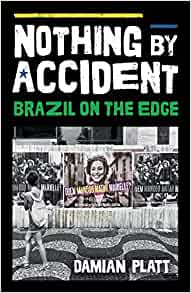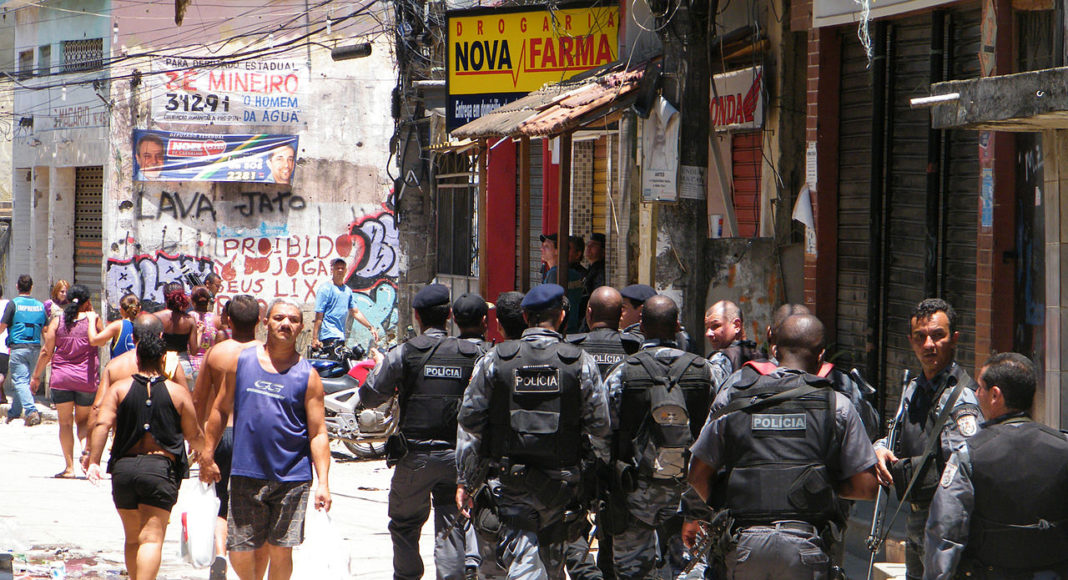Nothing by Accident – Brazil on the Edge
by Damian Platt, Independent Publishing Network, August 2020
Reviewed for LAB by Alistair Clark
This book is a very good account of how organised crime in Rio de Janeiro developed over the decades to its modern intertwining with the city’s famous Carnival, favelas, notorious police, and local politics. Its starting point is the murder of a local councillor and human rights campaigner, Marielle Franco, in 2018. Her assassination sparked nationwide outrage and brought international attention, not just to the city’s toxic politics and deadly policing, but also to its link with Brazil’s far right President Bolsonaro, a lethal relationship that is described in the final chapters.

The book as a whole blends, in a readable and chilling narrative, author Damian Platt’s own experiences with excellent explanations of the historical development of the jogo do bicho (an illegal street lottery), police corruption, mafia-style warfare, drug trafficking, the Globo media empire, and the rise of the murderous militias of off-duty policemen.
When reading this book, bear in mind that Rio de Janeiro is a particular facet of Brazil. Its past history as the national capital until 1960, its mountainous physical geography with very visible favelas next to middle class neighbourhoods, its economic dependence on media, tourism and oil rather manufacturing or agriculture, and its international fame, means that until recently, Brazilians from other states could have viewed Rio as unique, not representative of Brazil as a whole.
However, the election of Jair Bolsonaro in the 2018 Presidential election and the national rise of Pentecostalism with its large ultraconservative congressional group in Brasilia, prompted many to rethink. The runoff choice for President was between Bolsonaro and the soft-speaking Fernando Haddad of the PT (Worker’s Party). An economy in crisis and traditional hostility to the PT, exacerbated by the Lava Jato accusations of corruption against former president Lula and his party, secured the election for Bolsonaro.
My own base in Brazil is upstate São Paulo where many centrist and conservative acquaintances (and some friends too!) voted for Bolsonaro, knowing who he was, rather than vote for a moderate PT candidate such as the intellectual and competent Haddad.
As with Brexit here in the UK, many have now regretted their choice as Bolsonaro has increasingly revealed not just his toxic mind-set, but his wilfully ignorant and corrupt incompetence in [not] handling the Covid-19 crisis. In this sense, the book’s subtitle Brazil on the Edge is partly justified whereas a few years ago I too would have been tempted to say Rio is not typical of Brazil and have placed its specific toxicity in a sealed container.
Of course, that was never true – São Paulo is the base of the violent Primeiro Comando do Capital (PCC) national criminal organisation whose roots lie in the appalling conditions of Brazil’s prisons. The conservative evangelical churches, many instructing their congregations to vote for Bolsonaro and supporting him in congress in Brasilia via their elected deputies, have grown hugely across Brazil in recent decades, occupying the vacuum left by the absence of the state and lack of effective public services in favelas and slums nationwide. In the north of Brazil, land grabbers, illegal loggers and polluting gold miners have taken advantage of Bolsonaro’s power and know that they can invade indigenous reserves and exploit them with impunity.
So read this book as a compelling source of information and insight into Rio de Janeiro, along with the author’s striking personal testimony, and reflect about how it might extrapolate to the rest of Brazil.
Main image: Agência Brasil / Wikimedia Commons


